Using hair straighteners in Norway
Will my hair straighteners work in Norway?
Check that your hair straighteners can handle the voltage in Norway:
- If your hair straighteners can run using 240 volts or can support dual voltage (how to tell) then you will only need to bring a suitable power adapter for Norway listed below if the plug on your hair straighteners won't fit.
If not then you can either:
- Use dual voltage travel hair straighteners [2] - you might still need a power adapter for Norway however these cheap lightweight accessories are designed specifically for the rigors of travel.
- Use a power converter (or voltage transformer) - this enables you to use your existing hair straighteners and other applicances with a 240 volt Norwegian power outlet, however this is significantly heavier, bulkier and more expensive than dedicated travel hair straighteners. A voltage transformer changes the voltage but won't change the actual physical shape of the plug on your hair straighteners to fit in the types of power outlet used in Norway, therefore check that your power converter comes with the correct power adapter for Norway otherwise you will need to bring a seperate power adapter. Also worth noting that your existing hair straighteners might not be suitable for travelling and you risk damage in a suitcase. [7] [AD]
Using hair straighteners in Norway
Will my hair straighteners work in Norway?
That will depend on if your hair straighteners can operate using the 240 volts which are used in Norway:
- If you're using either dual voltage hair straighteners or your hair straighteners is designed to handle 240 volts and you have the correct plug adapter then you can use the hair straighteners in Norway.
- If not then then you will need to consider bringing either dual voltage travel hair straighteners [2] or a heavier and more expensive power converter. Read the guide on will a power converter work with hair straighteners in Norway for help deciding which solution is more suitable. [7] [AD]
Norway power outlets and plug sockets
What is the frequency used in a Norwegian power outlet?
The frequency from a Norwegian power outlet is 50Hz. [8]
What voltage is used in Norway?
Power outlets in Norway are 240 volts.
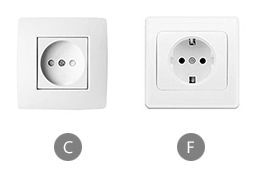
Type C and F power outlets
Which power adapter will you need to bring for using hair straighteners in Norway?
There are two different types of power outlets used in Norway, these are type F and C with the primary power outlets being type F:
- Plug Type C - You can identify this power socket by the 2 adjacent holes.
- Plug Type F - The recessed circular wall outlet, also known as the type F power outlet or Schuko socket, can be recognised by the two adjacent holes along with a pair of two thin grounding clips on the top and bottom.
A Type F power adapter allows you to use 240 volt hair straighteners in Norway, read the step-by-step guide below for full details of using a power adapter for Norway. Note that unless you that have dual voltage hair straighteners you might also need to use a power converter. [6] [9] [AD]
Dual voltage hair straighteners
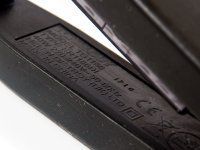
Single voltage hair straighteners
Are my hair straighteners dual voltage?
An easy way how to tell if your hair straighteners supports dual voltage is to look for either a sticker or numbers printed on the plug or handle of your hair straighteners. The location will vary depending on the make and model of your hair straighteners, it should also state on the box. Some dual voltage hair straighteners will change automatically, however other models will have a button which allows you to change between different regions.
- A specific number such as 110V indicates single voltage hair straighteners. If this number matches the 240 volts used in Norway then you should be able to use your hair straighteners with a Norwegian power outlet.
- A small voltage range with a dash such as 100-120V also indicates single voltage hair straighteners which can accomodate small voltage fluctuations. If the 240 volts used in a Norwegian power outlet falls within the range shown on your hair straighteners then you can use it in Norway.
- A large voltage range separated with a dash or slash such as 100/240V indicates dual voltage hair straighteners capable of being used in Norway or any other country.
Travelling to Norway with hair straighteners
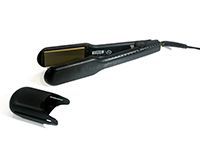
Travel hair straighteners with heat protective cap
Can I pack hair straighteners in my carry on to Norway?
According to the TSA guidelines for hair straighteners there are no restrictions when carrying mains powered hair straighteners in your hand luggage through airport security in the US. The TSA recommends that you should verify that the airline which is taking you to Norway will allow hair straighteners onboard and that they will fit in the overhead bin or underneath the seat of the airplane.
Packing your hair straighteners in a dedicated heat resistant protective hot tools travel case leaves them easily accessible when going through airport security checks, they can be packed away quickly and should avoid a tangle of power wires in your carry on luggage (the TSA suggests wrapping cords tightly around electric items such as hair straighteners). If you intend to bring fragile or expensive hair straighteners in your hand held luggage then it is advisable to use hard carry on luggage as this offers the most protection against knocks and bumps during transit. [10] [11] [12] [13] [AD]
Should I bring travel hair straighteners or domestic hair straighteners to Norway?
It is preferable to bring dual voltage travel hair straighteners rather than bringing your existing domestic hair straighteners to Norway as it is safer to assume that they'll operate correctly with the 240 volt power outlets used with a Norwegian power outlet, as long as you use the correct power adapter for Norway.
Please note that bringing expensive domestic hair straighteners could put them at risk due to potential damage or loss in your check in suitcase by a baggage handlers in Norway. The cost of replacing or repairing expensive specialised domestic hair straighteners in Norway might be more than buying much cheaper dual voltage travel hair straighteners [2] before setting off. If you intend to pack your own personal hair straighteners in your suitcase either slide them inside a sneaker or boot to protect from light damage, alternatively use a shockproof and heat resistant hot tools travel case or heat resistant mat pouch for hair straighteners and curling irons which will also allow the hair straighteners to be transported whilst hot without waiting to cool down. [12] [14] [AD]
Power converters for Norway
Do I need a converter in Norway to use my hair straighteners?
The correct type voltage transformer (or power converter) will allow your hair straighteners using a different voltage to operate with the 240 volt power outlet used in Norway. Travellers who want to bring along their existing domestic hair straighteners can use a power converter, however it can be more expensive to purchase a power converter than it is to purchase dedicated dual voltage travel hair straighteners [2]. A power converter is considerably heavier than travel hair straighteners making a power converter less suited for packing in luggage compared to travel hair straighteners. [7] [AD]
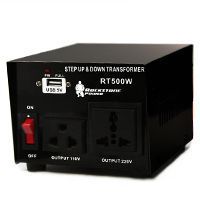
Voltage converter
What is the difference between a plug adapter and a voltage converter?
A heavy and expensive power converter converts a 240 volt Norwegian power outlet to work with non-240 volt hair straighteners, whereas a cheaper and smaller power adapter (or plug adapter) will change the shape of the plug on your hair straighteners to fit into a power outlet in Norway. [7] [AD]
Hair straightener safety
Are hair straighteners dangerous?
The temperature of the ceramic plates used in hair straighteners can reach over 200 degrees with the potential to burn hair, skin, and even start a fire if not used correctly. According to figures from Leicestershire Fire and Rescue Service electrical beauty products have been responsible for an estimated 650,000 fires in the United Kingdom alone.
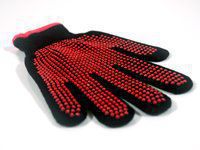
A heat resistant glove
How can I minimise risk using hair straighteners?
- Skin protection: Wear heat resistant gloves during styling to protect hands from heat.
- Children's protection: With 10% of children's burns being caused by hair straighteners it is recommended to look for flat iron hair straighteners which include a heat resistant bag to keep the plates closed shut when not in use, making it easier to store out of reach of children.
- Luggage protection: Placing hair straighteners directly into luggage without allowing them to cool down can risk damage to clothes and heating up combustible or flammable packed items. If your hair straighteners weren't supplied with a heat protective cap then wrap them in a heat resistant mat or use a hot tools travel case to pack them into luggage whilst warm. A travel case will also keep expensive hair straighteners protected from damage during transit.
- Hair protection: Applying a heat protectant spray prior to using hair straighteners is essential to prevent burning, as well as using the correct technique for your hair type - read our guide on how to use hair straighteners for comprehensive information.
- Fire protection: It can take up to 40 minutes for hair straighteners to cool down so resting your straighteners on a heat resistant mat could reduce the risk of setting fire to furniture. Forgetting to turn off hot domestic appliances can also cause fires. This risk can be reduced by using a model of straightener with a timer socket which will turn itself off automatically after a certain length of time, you can also add this feature to any basic straighteners by using a timer socket in a power outlet. [12] [14] [15] [16] [17] [18] [AD]
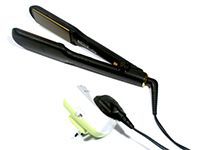
Hair straighteners connected to a timer power outlet
How can I add a safety timer to my existing hair straighteners?
1 in 12 owners of hair straighteners admit to forgetting to turn them off after use, unless your hair straighteners have a built in automatic timer then leaving them on could potentially start a fire. However you can add this functionality to any model even if it doesn't have an integrated timer:
- Add an automatic timer to any hair straighteners by plugging them into a timer socket then plugging the timer into a power outlet.
- Turn on the timer and use the hair straighteners as normal.
- After you have finishing using the hair straighteners turn off the power at the outlet.
- However if you forget to turn the power outlet off then the timer will automatically switch off the straighteners after a pre-set length of time. Depending on the model of timer this could be 15, 30, 60 or 120 minutes - ideally pick the shortest length of time possible.
- For added peace of mind use a power outlet splitter to share the outlet from the timer with both your hair straighteners and a lamp. When the timer is running both the straighteners and the lamp will be turned on, making the lamp a clear indicator that the straighteners are still being heated. When leaving a room it is second nature to ensure all lights are turned off, if the lamp is still on then this acts as a reminder to switch off the straighteners.
How to treat a hot iron burn
If you accidentally burn yourself run cold water under your burn and if it is severe it is advised to seek medical attention from a doctor or hospital.
How to use hair straighteners in Norway using a type C power adapter
How to use hair straighteners in Norway by using a two pin Type C travel charger.
- Check that your hair straighteners are either dual voltage travel hair straighteners [2] or works with a 240 volt power supply but if not then do not continue as you might create an electrical fire hazard, damage your hair straighteners or blow a fuse. Travel hair straighteners usually have a switch to toggle between voltages, before operating your hair straighteners make sure you have set it to the 240 volt setting for use in Norway, please consult the manufacturers instructions for more details on how to do this.
- You will need to bring a Type C power adapter [4] if the shape of plug used on your hair straighteners isn't the same type of plug outlet used in Norway. The Type C power adapter helps convert plugs from other countries for a power outlet in Norway by changing the shape of the plug, but the adapter doesn't change the voltage of your hair straighteners to work with a 240 volt supply.
- First plug in the Type C power adapter into the wall outlet. The power supply (sometimes called a Type C power outlet [3] or Europlug) is recognised by 2 adjacent holes.
- Then plug in the hair straighteners into the Type C power adapter.
- Switch on the Norwegian power outlet.
- Your straighteners should now be ready for use. [AD]
How to use hair straighteners in Norway using a type F power adapter
How to use hair straighteners in Norway by using a two pin Type F travel adapter.
- Make sure that your hair straighteners are either dual voltage travel hair straighteners [2] or works with a 240 volt power supply but if not then don't attempt these instructions as you could create an electrical fire hazard, blow a fuse or damage your hair straighteners. Before using a dual voltage travel straighteners which can toggle between different voltages make sure you have set it to accept 240 volts for use in Norway; please consult the user guide for more details on how to do this.
- You'll need to bring a Type F power adapter [6] if the type of plug used on your hair straighteners isn't the same type of power outlet used in Norway. This Type F power adapter is designed to fit plugs on appliances from other countries for a power outlet found in Norway by changing the shape of the plug, but it doesn't change the voltage of your hair straighteners to work with a 240 volt outlet.
- First plug the Type F power adapter into the wall outlet. This recessed circular power supply (known as the Type F power outlet [5] or Schuko outlet) can be recognised by the two 4.8mm adjacent holes where the twin plug outlet pins go and a pair of two thin grounding clips on the top and bottom.
- Then plug in the hair straighteners into the Type F power adapter.
- Turn on the Norwegian power outlet. Your straighteners should now be ready for use. [AD]
See also
- What can I connect to a Norwegian power outlet?
- What can I connect to hair straighteners?
- Can I charge my phone in Europe?
- Can I use my phone in Europe?
- Do I need a converter for my phone in Europe?
- Will my phone charger work in Europe?
- What are the dangers of using the wrong mobile phone charger in Europe?
- How do I charge a phone in Europe?
- How to call the US from Europe
- What outlets are found in Europe?
- Can I use my hairdryer in Europe?
- Can I use my flat iron in Europe?
- What is the cheapest airport to fly into in Europe?
- How to travel Europe by train
- How much is a Europass?
- Can I buy Rail Europe tickets at the station?
- Can I buy a rail pass in Europe?
- Can I buy Eurostar tickets on the station?
- Where can I buy Euros from?
- What denominations do Euros come in?
- Can I buy Euros at any bank?
- How do I convert dollars to Euros?
- Can I buy Euros with a credit card?
- Does Sweden use the Euro?
- Does the United Kingdom use the Euro?
- Does Denmark use the Euro?
- How long can an American stay in Europe for?
- Which countries are in the Schengen Area?
- What is the most spoken language in Europe?
- How many different languages are spoken in Europe?
- How many countries are there in Europe?
- What countries are in Eastern Europe?
- What countries are in Western Europe?
- What is Northern Europe?
- What countries are not in the European Union?
External links
We endeavour to ensure that links on this page are periodically checked and correct for suitability. This website may receive commissions for purchases made through links on this page. As an Amazon Associate WikiConnections earn from qualifying purchases. For more details please read the disclaimers page.
- Wikipedia - Norway Wikipedia web page
- Amazon - dual voltage travel hair straighteners
- iec.ch - Type C power outlet
- Type C power adapter - An unearthed Europlug Type C travel adapter with two 4mm rounded pins placed 19mm apart, designed to fit a variety of sockets commonly used across Europe, including Italy, France, Spain, Greece, Turkey, Croatia and Iceland..
- iec.ch - Type F power outlet
- Type F power adapter - A versatile Type F adapter, also known as Schuko, compatible with Europlugs and CEE 7/17 plugs. Ideal for use in countries using the Germany outlet type like Peru, Chile, and Uruguay..
- Power converter - Heavy-duty power converters are designed to convert voltage levels between different electrical standards, shifting between 110V/120V and 220V/240V with both 50Hz and 60Hz, often incorporating safety features such as fuse protection and circuit breakers..
- Wikipedia - WikiPedia - Mains electricity by country -
- iec.ch - IEC World Plugs by location -
- Dual voltage travel flat iron hair straighteners - Dual voltage flat iron hair straighteners are equipped with adjustable temperature settings, providing 110/220 volts compatibility for global use. Titanium-coated plates ensure even heat distribution, making them ideal for international travel..
- tsa.gov - TSA guidelines for hair straighteners -
- Hard case for hot tools - Hard case designed for storing and protecting a flat irons, curling irons and hair straighteners.
- Hard carry on luggage - Hard carry-on luggage features a tough outer shell to absorb impact and is recommended for transporting heat tools or fragile electronics in overhead bins..
- Heat resistant mat pouch for hair straighteners and curling irons - Protects surfaces from hot hair irons and wraps around the appliance allowing instant packing into baggage.
- Heat resistant gloves for hair styling - Heat resistant glove recommended to protect skin against the risk of heat from a curling iron, flat iron or hair dryer.
- Heat protectant spray - Thermal protector spray used prior to styling with heated tools such as blow dryers and flat irons.
- Energy saving outlet with timer - Timer sockets are external adapters that interrupt power after a set period, making them useful for appliances that lack inbuilt automatic shut off..
- Flat iron hair straighteners which include a heat resistant bag - Hair straighteners supplied with a heat-resistant storage pouch which allows the hot plates to be safely packed away immediately after use making them ideal for travel..
- Power outlet splitter - A power outlet splitter transforms a single wall outlet into multiple AC outlets which is a practical solution for using multiple appliances in locations with limited access to power outlets, such as hotels or airports..
| 2 other devices in this category | |
| Connecting a Norwegian power outlet to: |
|